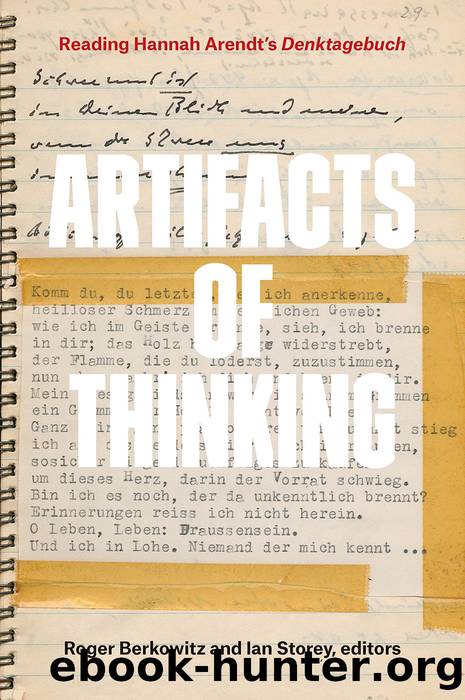Artifacts of Thinking: Reading Hannah Arendt's Denktagebuch by Roger Berkowitz & Ian Storey

Author:Roger Berkowitz & Ian Storey [Berkowitz, Roger & Storey, Ian]
Language: eng
Format: epub
Tags: Philosophy, Political, Criticism, Political Science, History & Theory
ISBN: 9780823272174
Google: Uz80yQEACAAJ
Goodreads: 30688797
Publisher: Fordham University Press
Published: 2017-01-15T06:28:29+00:00
The Intensification of Life
Portmann, whose career as a zoologist, biologist, and public intellectual stretched from the 1920s into the 1970s, saw himself as engaged in a shift in the sciences that reoriented our relation to the natural world. This was not a paradigm shift, nor indeed a change that was distinctive to the twentieth century or even to modernity, and it was not a change that would eventually be carried through and brought to completion; rather it happened in every epoch, to all peoples, and indeed in the course of each human life. What he described was a move from the primary, urprimitiv experience of being in relation to the world, on the one hand, to the secondary, scientific worldview on the other. âThis drama renews itself in every experience of becoming,â he wrote in 1960.23 The form it took in his field, in his time, was a move away from the observation and description of forms of life as they appear, and towards those investigations in physics, chemistry, and biology that delve into the unseen, reaching for their evidence beyond what is available to the naked eye or indeed made available by the microscope. Why should subatomic physics and molecular biology come to dominate as they did? Because, according to Portmann, they are propelled by the conviction that it is in the realm of the unseen that the key to the mastery of nature lies.
The critique is not unfamiliar. Feminist philosophers took up a version of it in the 1980s as they reread early modern philosophers and found them deploying a masculinist, objectivist worldview that would turn out to destroy the intimacy of our relation with the mothering natural world.24 It would also have been familiar to Portmannâs audience in another version, Goetheâs botany, which was a study of the observed forms of living plants. As we have seen, Arendt shares this sensibility in her affirmation of appearance and her rejection of otherworldly sources of meaning. Portmann, for his part, had no illusion that his style of morphological research would or should supplant the predominant form of scientific research. He had a clear view of the forces that drove science to focus on questions involving the general functions of life and to pursue the most general laws of biology, but, in Animal Forms and Patterns (1948), he sketched them in a way that was far from celebratory.25 Certainly, the scientific knowledge that had been amassed using this method had been put to work healing the sick and making us more productive, but also simply exerting power over material things and developing technologies of destruction.26 This was three years after the liberation of Auschwitz and the destruction of Hiroshima and Nagasaki.
He dramatized the distinction between the primary and secondary views of the natural world over the course of many works, and argued for the primitive view as a corrective to the dominant scientific approach. At some moments the arguments are epistemological. In Animal Forms, he notes that âthe search for the general laws of life has produced more facts than we can yet grasp.
Download
This site does not store any files on its server. We only index and link to content provided by other sites. Please contact the content providers to delete copyright contents if any and email us, we'll remove relevant links or contents immediately.
The remains of the day by Kazuo Ishiguro(8970)
Tools of Titans by Timothy Ferriss(8365)
Giovanni's Room by James Baldwin(7326)
The Black Swan by Nassim Nicholas Taleb(7106)
Inner Engineering: A Yogi's Guide to Joy by Sadhguru(6785)
The Way of Zen by Alan W. Watts(6600)
Asking the Right Questions: A Guide to Critical Thinking by M. Neil Browne & Stuart M. Keeley(5757)
The Power of Now: A Guide to Spiritual Enlightenment by Eckhart Tolle(5749)
The Six Wives Of Henry VIII (WOMEN IN HISTORY) by Fraser Antonia(5496)
Astrophysics for People in a Hurry by Neil DeGrasse Tyson(5182)
Housekeeping by Marilynne Robinson(4436)
12 Rules for Life by Jordan B. Peterson(4299)
Double Down (Diary of a Wimpy Kid Book 11) by Jeff Kinney(4261)
Ikigai by Héctor García & Francesc Miralles(4246)
The Ethical Slut by Janet W. Hardy(4242)
Skin in the Game by Nassim Nicholas Taleb(4237)
The Art of Happiness by The Dalai Lama(4125)
Skin in the Game: Hidden Asymmetries in Daily Life by Nassim Nicholas Taleb(3989)
Walking by Henry David Thoreau(3952)
